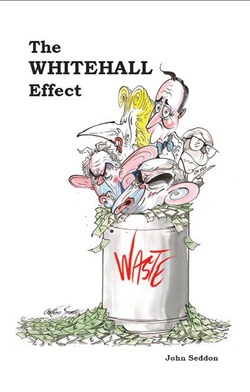The Whitehall Effect ~ John Seddon - Online Notes
|
Links below take you to the chapter notes:
Introduction 1. Prelude Part 1: The industrialisation of public services 2: Call centres 3. Back Offices 4. Shared Services 5. Outsourcing 6. Information Technology Part 2: Delivering services that work Introduction 7. A better philosophy 8. Effective change starts with ‘study’ 9. Better thinking, better design 10. ‘Locality’ working 11. IT as pull, not push Part 3: Things that make your head hurt 12. Targets and standards make performance worse 13. Inspection can’t improve performance 14. Regulation is a disease 15. It’s the system, not the people 16. Incentives always get you less Part 4: ideology, fashions and fads 17. Choice 18. Personal Budgets 19. Commissioning 20. Managing demand 21. Nudge 22. Procurement 23. Risk management 24. Lean 25. IT: features over benefits Part 5 Change must start in Whitehall 26. Beware economists bearing plausible ideas 27. Whitehall is incapable of doing evidence 28. Getting a focus on purpose |
4. Shared Services
1] John Seddon, 2010, ‘Why do we believe in economy of scale?’ View 2] National Audit Office (NAO), March 2012, Efficiency and reform in government corporate functions through shared service centres, Report by the Comptroller and Auditor General HC 1790 Session 2010–2012. 3] Browne Jacobson, 2008, Shared services survey 08: The Report, with Foreword by Sir Peter Gershon, CBE View www.conservatives.com, 2010, ‘Cut Labour’s waste to stop their tax rise on working people’ View 4] HM Treasury, 2009, Operational Efficiency Programme: back office operations and IT, written by Martin Read. View 5] House of Commons Public Accounts Committee, 2008, Shared Services in the Department for Transport and its agencies: Fifty–seventh Report of Session 2007–08. View 6] National Audit Office, 2011, Shared Services in the Research Councils, Report by the Comptroller and Auditor General HC 1459 Session 2010-12, 21 October 2011: “By March 2011, implementation costs totalled £130.5 million, exceeding the original budget of £78.9 million by 65 per cent, with some residual functionality still to be developed. On a best case, the project has reported gross savings to March 2011 of £27 million but is at least £73.2 million behind the business case projections and is expected to fall further in the future.” 7] ResearchBlogs, August 14 2010, ‘Delpy says Shared Services Centre remains on track’. View 8] Times Higher Education, 23 August 2012, ‘Shared Services Centre is “below standard” and new tasks won’t help it improve, says STFC head’. Byline: Elizabeth Gibney. View 9] Ibid. 10] For example, see blogposts at: View and View 11] From Account NI, 2013, Review of a Public Sector Financial Shared Service Centre. View 12] BBC News, 14 May 2014, ‘PAC says Account NI payment cost “extraordinarily high”’. View 13] From Account NI, 2013, Review of a Public Sector Financial Shared Service Centre. View 14] BBC Democracy Live, 23 January 2014, ‘Auditor general criticises financial centre checks’. View 15] Public Finance, 14 May 2014, ‘Northern Ireland PAC slams costs of shared financial services scheme’. Byline: Vivienne Russell. View 16] Computing.co.uk, 7 June 2011, ‘Savings from Somerset shared services falling well short of target’. Byline: Gareth Morgan. View 17] Public Finance, 1 May 2011, ‘All in this together?’ Byline: Karen Day. View 18] Ian Liddell-Grainger MP blog, 19 January 2012. View 19] Western Daily Press, 16 February 2012, ‘“Failing” Southwest One comes under fire from Somerset County Council leader’. View 20] BBC Points West on Southwest One Review Report, 6 June 2011. View 21] Local Government Lawyer, 25 February 2014, ‘Report into Southwest One pinpoints “incredibly complicated” contract’. View Contract exit costs were settled out of court for £5.9m, the council believed it might have had to pay as much as £40m if it had lost the case. View 22] HM Government, December 2012, Next Generation Shared Services: The Strategic Plan. View 23] NAO Press Release, 31 March 2014, ‘Update on the Next Generation Shared Services Strategy’. View 24] Amyas Morse, head of the National Audit Office, 7 March 2012: “The initiative for government departments to share back-office functions has suffered from an approach which made participation voluntary and tailored services to meet the differing needs of individual departments. The result was over complexity, reduced flexibility and a failure to cut costs. The new Cabinet Office strategy on shared services acknowledges these issues but, if it is to achieve value for money, it must learn the lessons from past implementation. Only in this way can the sharing of back-office functions have a realistic prospect of contributing towards the government’s drive to cut public spending in the long term.” View 25] The LGA published a map on 30 May 2014 which showed 337 councils across the country engaged in 383 shared service arrangements. The resultant claimed savings were £357 million. View 26] IT News for Australian Business, 12 August 2013, ‘WA to pay $370m to scrap Shared Services’. Byline: Allie Coyne, Paris Cowan. View |

